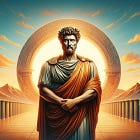"Too late."
These two simple words have probably killed more dreams than failure ever has.
They whisper to us when we think about changing careers, learning new skills, or pursuing long-forgotten passions. They make us settle for less than we want, convincing us that our time has passed.
But here's the truth: "too late" is a myth we tell ourselves.
It's a comfortable excuse that protects us from the uncertainty of change and the possibility of failure. It's time to challenge this limiting belief.
The Truth About Time
Time isn't a countdown clock working against you. It's a continuous flow of opportunities that never stops offering chances for growth and change. Every morning you wake up is a new beginning, regardless of the number of mornings that came before.
When you say "it's too late," what you're really saying is "I'm afraid".
Afraid of starting over. Afraid of looking foolish. Afraid of failing.
But consider this - isn't it more frightening to reach the end of your life wondering "what if?"
Marcus Aurelius understood this deeply. He wrote his most meaningful work while in his fifties and sixties, facing war and plague. He noted that each moment is a chance to start again, to redefine who we are and what we stand for. The past doesn't determine our future unless we let it.
Using Time Wisely: Seneca's Warning
The great Stoic philosopher Seneca once wrote to a friend:
"It is not that we have a short time to live, but that we waste a lot of it."
He observed how people would spend years waiting for the “right time” to start living the life they wanted. They'd say "After this project..." or "Once I turn this age..." or "When I have more experience..."
But Seneca saw through this delusion. In his powerful work "On the Shortness of Life", he pointed out that we keep postponing our happiness and goals to some imaginary future point - a point that keeps moving further away as we approach it.
Think about it: How often have you said "I'll start next month" or "Maybe next year"? Each time we do this, we're operating under the assumption that time is an endless resource. But as Seneca reminds us, "Life is long if you know how to use it."
The key isn't having more time - it's using the time we have well. A person who lives deliberately for one year experiences more life than someone who merely exists for fifty. This isn't about how many years you have left; it's about what you do with today.
Breaking the Mental Barriers
The "too late" mindset is built on false assumptions:
First, we assume success has a timeline. But look around: Morgan Freeman didn't become a household name until his 50s. J.K. Rowling was a struggling single mother before writing Harry Potter in her 30s. Ray Kroc was 52 when he started McDonald's. They didn't let age dictate their potential.
Second, we think our past defines our future. This is like driving while only looking in the rearview mirror. Your past experiences, even the failures, are tools for growth, not barriers to success.
Third, we believe we need to have everything figured out before starting. This perfectionism keeps us stuck. The truth is, no one has it all figured out – they just started anyway.
The Eternal Student: Lessons from Musonius Rufus
Musonius Rufus, often called the Roman Socrates, challenged the common belief that education and growth were only for the young. He argued that learning isn't just for career advancement or practical skills - it's a fundamental part of human flourishing at any age.
"For learning what is useful," he said, "age is never a barrier." Rufus believed that just as we wouldn't stop caring for our physical health as we age, we shouldn't stop developing our minds and skills. In fact, he argued that older students often learn more deeply because they understand the true value of knowledge.
This ancient wisdom perfectly counters our modern obsession with early achievement. When we view ourselves as eternal students, age becomes irrelevant. The question isn't "Am I too old to learn?" but rather "What can I learn today?"
Your life experience isn't a barrier to learning - it's your greatest teacher. Every setback you've faced, every challenge you've overcome, every mistake you've made has prepared you to learn and grow in ways that wouldn't have been possible in your younger years.
The Hidden Advantage of Starting Late
What we call "starting late" often means starting with wisdom. Every year you've lived has equipped you with:
Understanding of human nature that only experience can teach
Clear vision of what truly matters to you
Resilience built through overcoming challenges
Network of relationships and knowledge
Deeper appreciation for the journey itself
These aren't disadvantages – they're your secret weapons.
The Power of Now
Every moment you spend thinking it's too late is a moment you could spend taking action. The time will pass regardless. One year from now, you'll either be one year older with a start on your dreams, or one year older with only regrets.
Starting doesn't mean dramatically upending your life. It means taking one small step today.
Want to write a book? Write one paragraph.
Want to change careers? Research one course.
Want to get fit? Walk for ten minutes.
The size of the step doesn't matter. What matters is breaking the paralysis of "too late" with action.
Overcoming the Fear
Fear of starting late often masks deeper fears:
Fear of judgment
Fear of wasted effort
Fear of discovering what might be possible
But consider this: The judgment you fear from others is nothing compared to the judgment you'll feel from yourself if you never try.
Your journey isn't a race against others or against time. It's your unique path, moving at your unique pace. The only real deadline is the one you set for yourself.
📝 Today's Stoic Gameplan
Claim Your Power: Start your day by declaring, "It’s not too late for me. Every moment is a chance to begin again, and I embrace this truth fully."
Challenge the Myth: Identify one dream, goal, or passion you’ve set aside because you thought it was too late. Write it down, and ask yourself: What’s truly stopping me from starting today?
Take One Bold Step: Choose a small, meaningful action that disrupts the "too late" mindset. Whether it’s drafting a plan, signing up for a course, or making a connection, act on it immediately.
Celebrate Progress: At the end of your day, reflect in your journal: How does it feel to reject the "too late" belief? What have you gained by taking this step? How can you build on this momentum tomorrow?
The best time to plant a tree was twenty years ago. The second best time is now.
This is a truth about every dream, goal, and change you want to make in your life.
Your age, your past, your circumstances – these aren't barriers unless you let them be. They're part of what makes your journey unique and valuable.
Start today. Start small.
But most importantly, start.
Stay stoic,
Related posts:
8 Must-Read Books on Stoicism for Personal Growth
The Effects of Screen Time: Stress, FOMO, and Mental Fatigue
How Marcus Aurelius Mastered Resilience — And How You Can Too
How to Take Action When You Don't Feel Like It









Literally NEVER too late.
At 44, I’ve already lived like 6 lives.
If I’m lucky, I’ll get to live at least 6 more.
Many people who rush on date and marriage early in their lives tend to “live free, die young”.